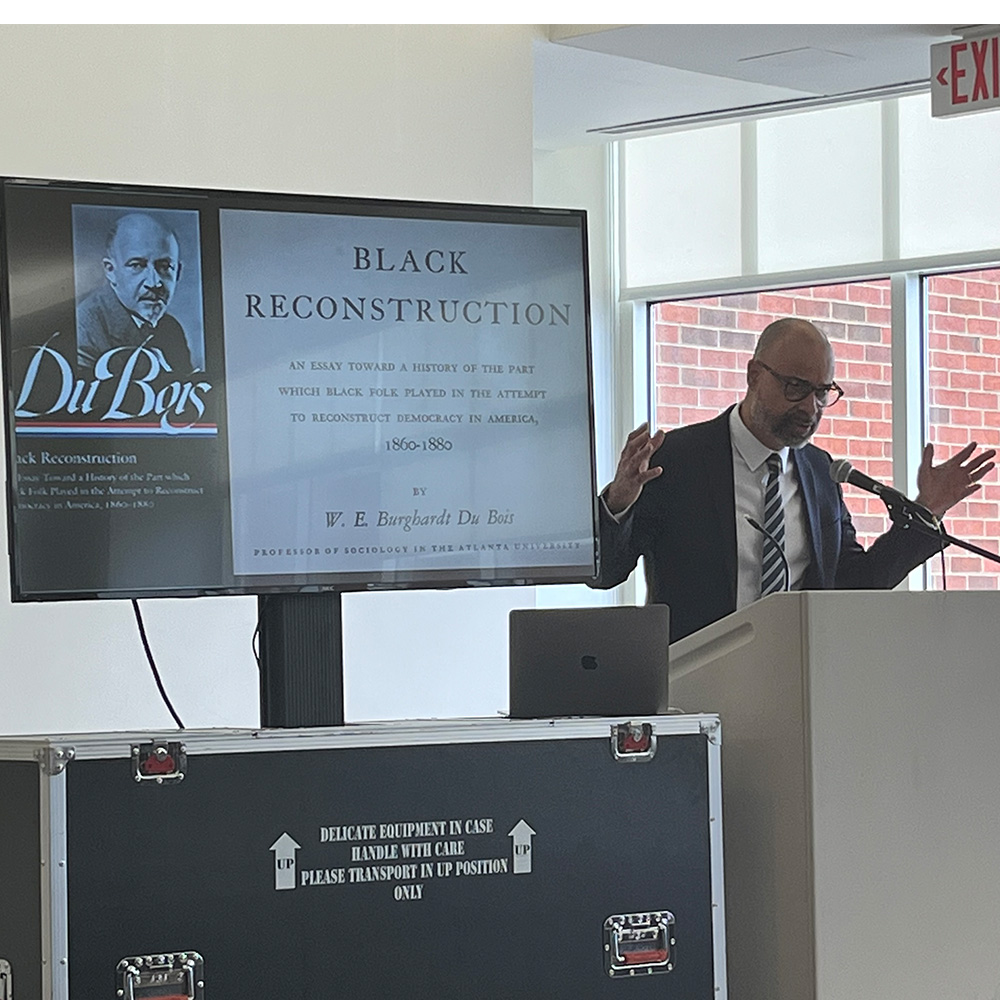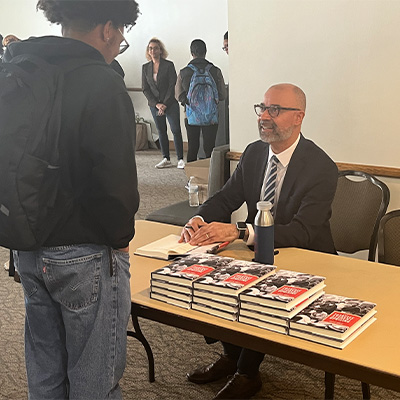In This Story

When Brian P. Jones was teaching in Harlem in the early 2000s, he fought against what he saw as a movement to privatize public education, which he feared would rip the rug out from the education of his almost all Black students.
“It got me thinking about patterns of Black education and how Black students themselves have so often challenged patterns of social engineering,” said Jones. “That's what brought me all the way back to Tuskegee; there was no book on that, so I wrote the book.”
His book, “The Tuskegee Student Uprising: A History,” was the focus of his talk as George Mason University’s 2023 W.E.B. Du Bois Lecture Series guest speaker hosted by the African and African American Studies Program.
Jones is currently the director of the Center for Educators and Schools at the New York Public Library.
“[The series] invites noted national scholars to come and speak about their research on the Black experience, and how it connects to the legacy of Du Bois,” said LaNitra Berger, director of African and African American Studies Program. “As soon I saw Dr. Jones’s book, I knew that it was exactly the kind of book that we would want our students to read, and the kind of conversation we would want to have as a Mason community.”
Jones, whose father went to Tuskegee, conducted six years of research on the university and its students. He and his father took a road trip to the university to dig through some of the archives, he said.
Tuskegee arose after the overthrow of Reconstruction. “Reconstruction,” Jones said, “is interesting because we're looking at a moment of Black power whose effects are democracy, and actually are of great benefit to the majority White population.”
Du Bois called this “a moment in the sun,” said Jones. It is mentioned in Du Bois’s book, “Black Reconstruction: 1860-1880,” and references the time between slavery and Jim Crow.
“It was overthrown with violence, with terror, with intimidation, and murder. Schools that were built, were then burned,” said Jones. When Booker T. Washington founded the Tuskegee Institute as a teacher-training school in 1881, he downplayed the idea that Black people should fight for civil and political rights, and emphasized education, hard work, and land ownership instead.
As part of his talk, Jones shared photos that he took or found during his research. The images included student strikes from 1896 and 1903, and the statue of Booker T. Washington that greets visitors to the Tuskegee campus in Alabama that shows him holding the Veil of Ignorance over an enslaved person—some argue he is pulling it up, while others argue he is putting it down. He also shared photos of some of his interview subjects including the first Black woman elected student body president at Tuskegee, Gwen Patton.
“To me, Gwen Patton represents the political savvy of Tuskegee students whose radicalization and intellectual development was largely happening off campus. She would participate in sit-ins and other protests off campus before going back to class, said Jones.

During the question-and-answer portion of the lecture, a student asked Jones, “How did you feel while you were interviewing the student activist?”
“I talked to 21 former Tuskegee students and community members. I remember feeling a sense of pride that I was able to help them pass along a story that they held,” said Jones. “It’s little bit daunting to have somebody give to you something that's so important to them, and to try to do it justice.”
Du Bois touched many academic subjects including art history, education, politics, and sociology, said Berger. “His scope was so wide in terms of the ideas that he infused that naming the lecture after him allows us to invite scholars from almost any discipline.”
“There are many brilliant Black student movements across many campuses who aren’t just going to take the world as it is, they’re going to change it,” said Jones.
